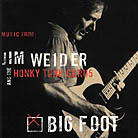October 2000
Why? Well, put simply, Weider, who came up playing in Nashville with people like Johnny Paycheck and James Talley, and, more recently, The Band, appears not to have any original ideas. More to the point, he seems excessively proud of what he sees as his "place" in the lineage of electric-blues-guitar tradition. The exhaustive liner notes make this clear: For each song, we are informed not just of the human personnel, but also of exactly which guitar(s) and amp(s) were used by Jim (and for more on this, you can visit his website, which devotes ample space to a photo gallery of Weider’s impressive collection of vintage electric guitars, amps, and effects). Normally, this can be entertaining, but here, it only serves to amplify the fact that these tools are used to (mostly) boring ends, covering up for a paucity of interesting musical ideas. In fact, Weider pretty much tells us exactly whose style and tone he favors most -- as if it weren't relatively obvious: Roy Buchanan. True, several numbers on Big Foot veer off into territories of tone and arrangement that Buchanan didn't spend much time on, but Buchanan’s classic, biting, clear Telecaster tone is featured prominently. Somehow, this fails to qualify Weider for the mantle of "Telecaster Master." Weider would do well to let go of Buchanan and focus on developing a tone and style that he could claim proudly are HIS. If he’d done that on Big Foot, it would have been a much more interesting record. Instead, we get a record full of ossified blues licks, "classic" guitar tones, and effects, which render nearly every track (including the five covers) D.O.A. The covers illustrate most powerfully what’s wrong with this record. Most telling, perhaps, is the inclusion of "Little Miss Lover." It’s not a bad version, but do we need one? NO -- not when the original belongs to JIMI HENDRIX. Weider’s playing is fine, but are we to be as impressed with a guy who’s had 30 years to nail an imitation, as we were impressed with Hendrix, who was inventing something new before our eyes? And Depew actually tries to imitate Hendrix's throaty, round, vocal style. Please. The rest of the record? A couple rave-ups (e.g., the title track), a sappy love song or two, and other tired covers. "Many Rivers to Cross"? Argh. Weider obviously worked hard on this record and believes in it, but I find nothing about it particularly worthwhile or redeeming. In fact, Weider’s decision to cover Hendrix, of all people, illustrates perhaps where Weider himself stopped evolving. Someone might point out to him that Hendrix and Buchanan are long gone, and that both are too heavy as players and personalities to be upstaged or "improved upon." Then let them go and do something interesting. GO BACK TO: |
 Jim Weider - Big Foot
Jim Weider - Big Foot![[Reviewed on CD]](../format/regcd.gif) Clearly,
Jim Weider’s Big Foot is a labor of love. With a boatload of special guests
(including Harvey Brooks, Tony Levin, and the late Rick Danko, among MANY others), careful
-- nay, meticulous -- arrangements and attention to detail, and an abiding love for
what he does, Weider is poised to deliver a knockout. Unfortunately, he doesn’t.
Clearly,
Jim Weider’s Big Foot is a labor of love. With a boatload of special guests
(including Harvey Brooks, Tony Levin, and the late Rick Danko, among MANY others), careful
-- nay, meticulous -- arrangements and attention to detail, and an abiding love for
what he does, Weider is poised to deliver a knockout. Unfortunately, he doesn’t.